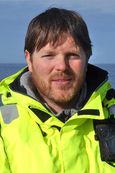Project
marEEchange - Marine ecological-economic systems in global change: responsibility for regime change and sustainability

Marine ecological-economic systems in global change: responsibility for regime change and sustainability
The stocks of cod and herring in the western Baltic Sea have collapsed. At the same time, cod and herring are important target fish species for commercial and angling fisheries. The BMBF-funded project aims to observe the change in the socio-ecological system of the western Baltic Sea in real time following the collapse of the cod stock in order to develop pathways for sustainability.
Background and Objective
The aim of the Thünen-OF marEEchange subproject is to transform a resource management system (mixed commercial and recreational fisheries) into a socially and economically sustainable system that utilizes the resources of the Baltic Sea in an ecologically sustainable way. Such an approach requires a high degree of stakeholder understanding, such as the perception of stakeholders regarding the occurrence of an ecological tipping point in the western Baltic Sea, the causal responsibilities for the identified tipping points and the investigation of management measures introduced in response to the tipping points. Other intermediate objectives are the identification of short-term changes (recreational and commercial fisheries, ecosystem) to inform stakeholders and identify pathways for transition and the identification of non-provisional ecosystem services of the Baltic Sea, e.g. cultural identity, wellbeing, etc.
Approach
In marEEchange, we will use the extensive information from the series of marEEshift stakeholder workshops (2019-2020) to analyze how stakeholders assign causal responsibility for tipping points. In particular, we will use the mental models of the western Baltic cod stock and the answers to questions on possible causes for the previous decline of the cod stock in 2015 (both questionnaires and audio recordings of the workshop discussions).
We examine the re-organization of the marine recreational fisheries sector after the regime change in terms of (a) the complete abandonment of the fishery, (b) the switch to other fishing grounds, (c) the adjustment of fishing effort, (e) the change in catch and catch-and-release rates, and (e) the change in target species. This also includes the question of what effects this will have on fishing tourism on the Baltic Sea coast. The benchmark is obtained from the available past (2014/15) and current (2021/22) nationwide representative surveys. To monitor the restructuring, we are proposing a new angler survey. In addition, TI employees have been conducting continuous on-site surveys of anglers in the Baltic Sea since 2002, which are to be continued in subsequent years. As part of these surveys, more social science data will be collected and evaluated to determine the importance of angling for health and social wellbeing as well as changes in the composition of anglers and angling behavior. In addition, anglers' pro-environmental attitudes will be assessed using a modified New Ecological Paradigm (NEP) scale and anglers' knowledge of the effects of climate change on fish communities. This data will be used to investigate anglers' understanding of sustainable fisheries management and to improve understanding and communication between angling and conservation stakeholders.
As part of the sustainability transformation of recreational fishing, we address the non-consumptive motives for angling, such as recreation, nature experience and health, which are often more important to anglers than catching fish. In Detail, we will look at human-nature relationships (relational values) of recreational anglers to identify pathways for sustainability transformation in recreational fisheries. In order to cover the entire western Baltic Sea, and as we expect considerable differences between countries, these questions will be investigated by means of an online survey in Germany, Sweden, Denmark and Poland. Since fish are released on a large scale when fishing without removal, anglers are also asked about their attitude towards catch & release fishing and their level of knowledge about release practices of fish and animal welfare treatment of fish.
The importance of local coastal fishing for local identity, sense of place and coastal tourism will be investigated through media analysis (local and national print media; social media).
Thünen-Contact

Involved Thünen-Partners
- Conrad, FrankOF Institute of Baltic Sea Fisheries
- Gebel, Andreas OF Institute of Baltic Sea Fisheries
- Jankiewicz, TomOF Institute of Baltic Sea Fisheries
- Lewin, WolfOF Institute of Baltic Sea Fisheries
- Niewöhner, MiriamOF Institute of Baltic Sea Fisheries
- Riechers, MarajaOF Institute of Baltic Sea Fisheries
- Weltersbach, SimonOF Institute of Baltic Sea Fisheries
Involved external Thünen-Partners
-
Leibniz-Institut für Gewässerökologie und Binnenfischerei (IGB)
(Berlin, Deutschland) -
Humboldt-Universität zu Berlin
(Berlin, Deutschland) -
Albert-Ludwig Universität Freiburg
(Freiburg, Deutschland) -
Deutsches Zentrum für integrative Biodiversitätsforschung (iDiv), Halle-Jena-Leipzig
(Leipzig, Deutschland) -
Universität Hamburg
(Hamburg, Deutschland)
Funding Body
-
Federal Ministry of Education and Research (BMBF)
(national, öffentlich)
Duration
11.2023 - 10.2025
More Information
Project status:
ongoing

![[Translate to English:] [Translate to English:]](/media/_processed_/d/7/csm_Startseite-OF_03_c0dfd6e750.png)
![[Translate to English:] [Translate to English:]](/media/_processed_/a/3/csm_20181116-151457-Stella-Jerome-Fischfalle-Warnem%C3%BCnde-Dorsche-im-Netzk%C3%A4fig-5691_heller_3050c72fa2.png)




